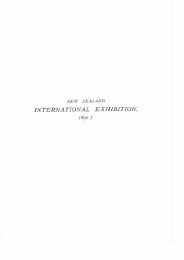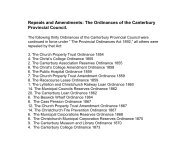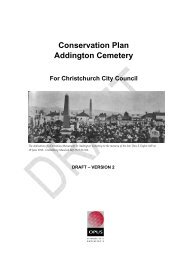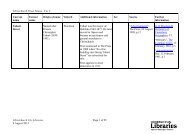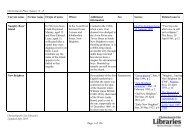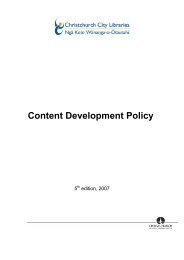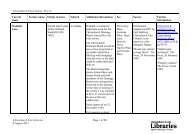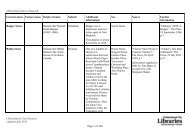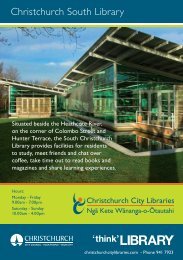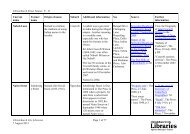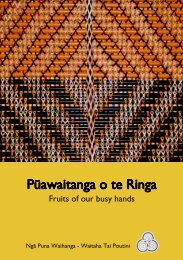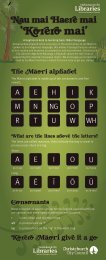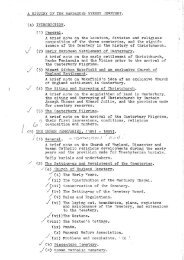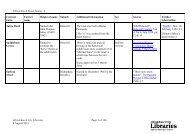Rich man, poor man, environmentalist, thief - Christchurch City ...
Rich man, poor man, environmentalist, thief - Christchurch City ...
Rich man, poor man, environmentalist, thief - Christchurch City ...
You also want an ePaper? Increase the reach of your titles
YUMPU automatically turns print PDFs into web optimized ePapers that Google loves.
Augustus Florance junior and wife, Elizabeth née<br />
Hamilton, about 1875<br />
30<br />
Augustus edited a threepenny temperance monthly, the<br />
Christian labourer , the contents of which were ‘in harmony<br />
with the teachings of the law of God, science and experience’.<br />
In Volume 1, No 1, dated September 1877, the editor defended<br />
total abstinence:<br />
‘It is from the moderate use of intoxicating liquors that all<br />
the drunkenness of the world springs, and, unless we at once<br />
arise and close for ever this broad road to hell, our sons and<br />
daughters will be had to supply the mad-house and gaol, and<br />
to double the number of drunkards who are rushing over the<br />
dark precipice of ruin.’<br />
The periodical also featured an article, ‘Smoking as an<br />
accessory to drinking’, wherein social, economic and medical<br />
problems – including cancer – were attributed to the inhalation<br />
of tobacco smoke. In later issues, Augustus stated that he<br />
wanted to ‘increase the spread of knowledge, the arts of peace<br />
and universal Christian brotherhood’.<br />
By 1877 Augustus was a husband and father. On 13 October<br />
1872, at St Luke’s, <strong>Christchurch</strong>, he had married Elizabeth<br />
Hamilton, the mother of a five-year-old ex-nuptial daughter,<br />
Ada. The couple’s own brood, Elizabeth, Augustus, Robert<br />
and David were born in 1874, 1878, 1881 and 1884 respectively.<br />
A nephew, Walter Kerr, thought Elizabeth stern and<br />
houseproud. During a bout of fever, in childhood, Augustus<br />
had lost his sense of hearing, and, although this meant that<br />
communication with his offspring was limited, the youngsters<br />
held him in great respect.<br />
Elizabeth’s father, pioneer New Brighton settler David<br />
Wilson Hamilton, owned a house, ‘the Grange’, and was<br />
proprietor of a coach service, the precursor of the tramway<br />
system, which ran from Sharlands Corner via Stanmore,<br />
Shirley and the New Brighton roads to the New Brighton<br />
Hotel in Seaview Road where he was ‘mine host’. Elizabeth<br />
Florance inherited 50 acres of low-lying land, some fertile,<br />
some less so where Mairehau Road, Frosts Road and Beach<br />
Road meet. Perhaps it was this family link with the seaside<br />
area which led Augustus to purchase, in 1879, Rural Section<br />
16034 of 20 acres on the north-east corner of the intersection<br />
of the Beach Road and Frees Road (the latter to become<br />
Racecourse Road and, finally, Bower Avenue). Augustus’ landholding<br />
is commemorated in the name Florance Street.<br />
On their property the Florances established a week-end and<br />
holiday home; bluegums stood at the gate. There being no<br />
road into the area, Augustus walked behind his horse as it<br />
trudged through the wastes where Bassett Street is now<br />
situated and across the Travis Swamp. On either side of the<br />
horse were panniers and in these perched the children.<br />
Eventually, the Avon Road Board formed Frees Road as a<br />
rough track. After work on Saturday night, Augustus would<br />
borrow a horse and dray and bring stores to his holding. To<br />
the Florance boys, the holiday home was an idyllic spot. When<br />
they wanted to bathe, they stripped naked at the house and<br />
clambered through the sand-dunes to the sea a mile off. There<br />
the silence was broken ‘only by the call of the sea-gull and<br />
the restless varied music of the surging surf’. When hungry,<br />
the children dug for pipis.<br />
Augustus, more conscious of the problems associated with<br />
seaside living, saw that the native vegetation did little to hold<br />
down the sand-dunes and that, whipped up by ‘an old-<strong>man</strong><br />
nor-wester’, these would move inland and spread over more<br />
productive land. Believing that every day should be ‘a<br />
Christian Sabbath of good works’, that the desert should<br />
‘blossom as the rose’ and that there should spring forth ‘two<br />
blades of grass... where none grew before’, he inaugurated a<br />
programme of sand-dune stabilisation.<br />
After unwisely experimenting with twitch, Augustus<br />
obtained lupin seed from Victoria’s government botanist,<br />
Baron Ferdinand von Mueller. This he sowed at some distance<br />
inland where clumps of stunted shrub afforded shelter. In two<br />
years the well-established plants were scattering their seed in<br />
all directions and there was a shoreward advance.



